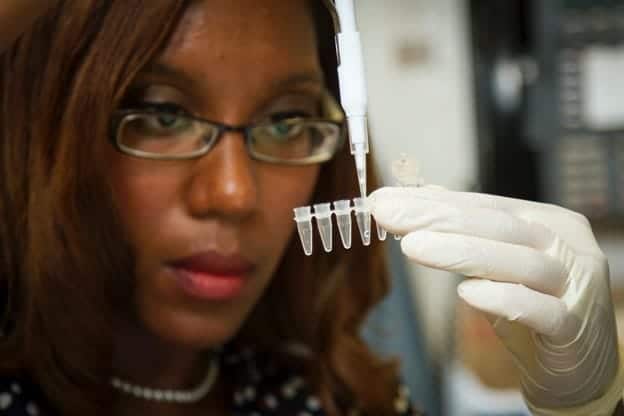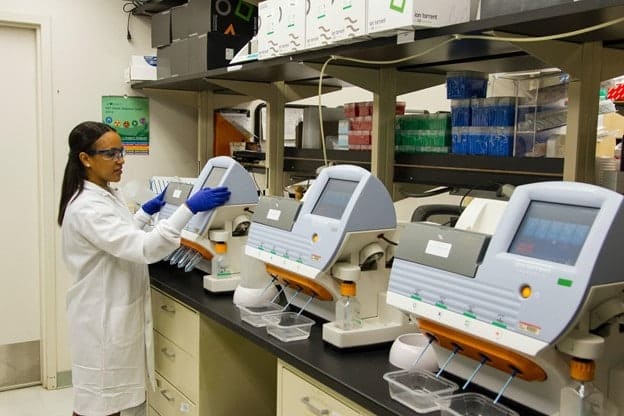Introduction to Molecular Biology: What is it?
Updated: June 19, 2024
Published: June 8, 2021

Everything around us, whether living or not, is made out of cells. For some of us, this simple fact seems obvious and uninteresting. For others, they see a door to a world of fascinating research possibilities. That’s where molecular biology comes in.
If you have a keen interest in studying science and you love learning about things like DNA, then molecular biology might be a great subject for you to major in.
Before you make any decisions, let’s take a closer look at exactly what molecular biology is, how it differs from other sciences, and whether or not you should study it in college.

What is Molecular Biology?
Molecular biology is a branch of biology that’s focused on looking at the molecular makeup of biological activity. In other words, it is a field of science that focuses on studying chemical structures involving molecules.
A lot of the focus of molecular biology is on DNA and RNA that are vital to the life process. Molecular biologists and scientists look at how molecules work within a cell and also how they interact with one another. That’s why this field is also closely related to other fields like biochemistry, biophysics, and genetics.
Through the study of molecular biology, scientists can not only research molecules, but also learn how to manipulate them. For this reason, molecular biology is a key part of a lot of cutting-edge science and new research.
Where Does a Molecular Biologist Work?
If you’re interested in molecular biology as a field of study, then you’d probably like to know where molecular biologists tend to work. It’s probably unsurprising for you to learn that many molecular biologists end up working in labs. Here, they can study molecule samples, perform research, and participate in experiments.
That being said, molecular biologists can also work in an office setting. In these types of office jobs, biologists will work with data to try and closely inspect the findings of experiments.
It’s important to note that whether working in an office or a lab, molecular biologists may work closely with toxic compounds and hazardous samples, so it’s always crucial to follow safety protocols.
The Differences in Molecular Biology, Biochemistry, and Genetics
We mentioned earlier that molecular biology is closely related to some other fields, but that doesn’t mean that they’re exactly the same. When it comes to addressing the similarities between molecular biology, biochemistry, and genetics, the main thing they have in common is that they all study organisms at the molecular level.
Still, each discipline is applied differently and also focuses on specific areas.
Molecular Biology vs. Biochemistry
In biochemistry, scientists and researchers are more attentive to molecules as compared to other proteins. Biochemistry is also more focused on nucleic acids and looking at chemical effects when different compounds interact.
One of the biggest differences is that biochemistry methodology uses a lot of organic chemistry when compared to molecular biology, so the way experiments are conducted would be different.
Molecular Biology vs Genetics
Studies and experiments in genetics take place on a much bigger scale than in molecular biology. This is because in genetics, scientists are focused on how genetic codes change or affect different organisms, and they also look at heritable traits. Heritability implies that studies are conducted by looking at wide sectors of the population.
When compared with molecular biology where scientists study molecules, genetics study large samples of people as well to reach their conclusions.
Subdisciplines of Molecular Biology

Source: Unsplash
Despite the fact that we can set molecular biology apart from other similar fields doesn’t mean that it doesn’t have other branches in itself. There are multiple different areas you can choose to study or conduct research in, so you don’t need to confine yourself to general molecular biology.
Here are a few of the more common subdisciplines that are either closely or loosely related to molecular biology:
- Molecular Genetics: The study of the molecular structure of DNA and how it influences the makeup of an organism.
- Toxicogenomics: This subdiscipline deals with collecting, storing, and interpreting details about gene activity when it responds to toxic substances.
- Comparative Genomics: A field of research where multiple organisms’ genomic properties are compared.
- Proteomics: The study of proteins and protein patterns on a larger scale.
- Functional Genomics: A subdiscipline that studies gene interactions and functions and their role in a body.
- Pharmacogenomics: This field researches how a person’s genes may affect their responses to certain drugs in order to develop safer medications.
- Gene Therapy: An experimental field with a goal of manipulating genes for the purpose of preventing or treating diseases.
- Structural Genomics: The process of researching and describing three-dimensional protein structures with computer modeling and experimental approaches.
- DNA Forensics: This field of study is often used in criminal investigations where DNA samples are used to create an identification of a suspect, and can also be used to check paternity or identify an unknown victim.
Should You Choose a Molecular Biology Major?
Essentially, this choice boils down to whether or not you’re interested in and passionate about this field. Still, there are certain factors you can consider to help you decide whether or not molecular biology is right for you.
For starters, if you know you’re interested in health and or a medical field but more on the research and science side, then molecular biology can be a great place for you to focus on human-related sciences. Not only that, but this is also an exciting field to be working in owing to the cutting-edge technologies that are coming out more and more frequently.
The field of molecular biology is set to see a growth in demand over the next 10 years of up to 19%, which is much higher than average compared to other industries. Therefore, choosing to study molecular biology can be a wise career move as you won’t be likely to struggle finding a job once you graduate.
What are the Education Requirements to Become a Molecular Biologist?
The demand for molecular biologists is high, making it a good field to study in, but it’s important to take into consideration that you’ll need multiple degrees to work as a molecular biologist.
Most molecular biologists need a PhD in molecular biology or a related field, like biology, biochemistry, or other similar majors.
It’s not impossible to find entry-level jobs with a master’s or even a bachelor’s degree, but if you want to advance in this industry, you will need higher degrees in order to work in labs, run experiments, or conduct research.
Wrapping Up
Molecular biology is a really exciting field to study and work in since it’s constantly developing and changing to adapt to new research methodologies. This can be a very rewarding path for someone interested in sciences and research, but just be aware that it requires a lot of education and dedication.
If you’re only just starting your higher education journey, we suggest choosing an undergraduate degree that will start you off on the right path to becoming a molecular biologist.
At University of the People(UoPeople), we offer a completely remote and tuition-free bachelor’s degree in Health Science that will teach you the basics you’ll need to apply to a more advanced program like a master’s in molecular biology.
